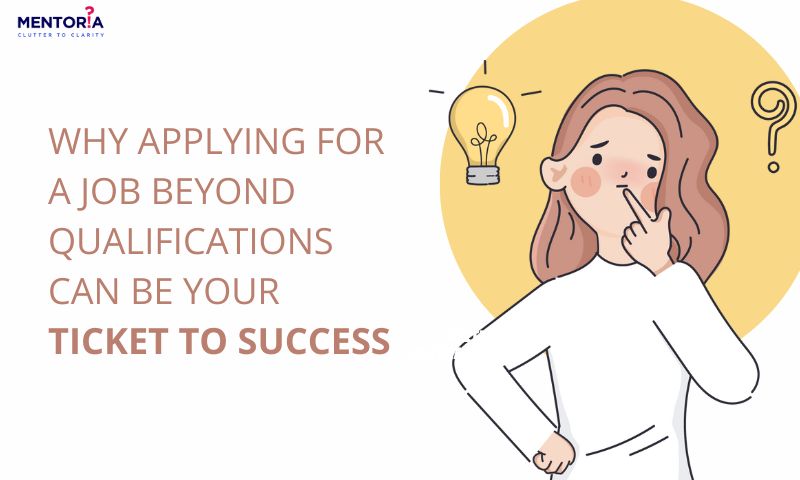Why Applying For A Job Beyond Qualifications Can Be Your Ticket To Success

Making the jump from textbooks to the professional hustle can feel like cracking a secret code, especially for fresh grads. You’re not alone if you’ve ever stared at a job post and thought, “Do I even qualify for being alive?” Here’s the deal: the skills you need for real-world success are often the rebels that skipped class. The skills that truly matter might not be the ones you studied. And the job application process? It’s basically an emotional rollercoaster of doubt and uncertainty.
But guess what? You don’t need to tick every box to land that dream job. In fact, embracing opportunities that make you stretch, even if you don’t match every requirement, could lead to a great career. This blog tells you why you should hit “Apply” even when you’re not the perfect match on paper.
Why You Should Apply For A Job Even When You Don’t Meet All The Qualifications
The Myth of Complete Qualification
Navigating job qualifications as a recent graduate can be like deciphering a cryptic code. A study by Harvard Business Review found that 85% of employers value potential and a willingness to learn over meeting all qualifications. It’s a common misconception that every skill needed for a job is learned in a classroom. In reality, jobs evolve, and employers anticipate new hires to grow into their roles. If you lack experience in certain areas, don’t let that deter you. An article in the Journal of Applied Psychology emphasises the importance of potential over current qualifications. Apply for roles that spark your professional development, as success often lies in your ability to adapt and learn on the job.
- Embrace Potential Over Perfection: Focus on showcasing your potential and eagerness to learn during the application process. Highlight instances where you’ve quickly adapted to new challenges in your academic or personal life.
- Tailor Your Resume Effectively: Craft a resume that emphasises transferable skills and experiences, showcasing how your background aligns with the job’s core requirements, even if you haven’t directly encountered them before.
- Seek Feedback and Iterate: Don’t hesitate to seek feedback on your application materials from mentors or career advisors. Use this feedback to refine your approach, making your application stronger with each iteration.
Stretch, Don’t Stagnate
Choosing roles where you’re already overqualified may provide immediate comfort but often leads to professional stagnation. A study in the Journal of Applied Psychology revealed that professionals seeking roles challenging their skill set reported higher job satisfaction and career fulfilment. Growth involves constant learning and pushing boundaries. Seek positions that stretch your abilities, prompting you to ask questions, seek mentoring, and make mistakes – crucial components of a thriving career. According to research, professionals who actively pursue roles that challenge their abilities experience increased job satisfaction and report a greater sense of achievement. Don’t settle for comfort; aim for growth, even if it means stepping into the unknown.
- Set Growth-oriented Career Goals: Define career goals that focus on continual growth and skill development. Seek roles that align with these goals, even if they initially seem challenging.
- Demonstrate Adaptability in Interviews: During interviews, share stories of times when you proactively took on new challenges or responsibilities. Illustrate your ability to adapt and learn quickly, emphasising your eagerness to tackle unfamiliar territory.
- Build a Diverse Skill Set: Actively seek opportunities to diversify your skill set. Participate in workshops, online courses, or side projects that expose you to new concepts and technologies relevant to your field.
Imposter Syndrome: A Common Culprit
Imposter syndrome, the fear of being exposed as unqualified, is a common hurdle in career progression. Over 70% of individuals, at some point in their careers, experience imposter syndrome, as noted in the International Journal of Behavioral Science. This phenomenon often stems from the assumption that others possess more confidence in their abilities. However, recognising imposter syndrome for what it is – a farce – is crucial. Everyone, including seasoned professionals, has faced the need to acquire new skills on the job. Understand that your journey involves continual skill development, and others likely share similar experiences. Don’t let imposter syndrome limit your potential; acknowledge it and use it as fuel for personal and professional growth.
- Acknowledge and Challenge Negative Thoughts: When imposter syndrome strikes, acknowledge the negative thoughts but challenge them. Reflect on your achievements and remind yourself that everyone, including successful professionals, faces moments of uncertainty.
- Create a Positivity Journal: Maintain a journal where you document positive feedback, successful projects, and personal achievements. Refer to this journal when self-doubt creeps in to reinforce your capabilities.
- Connect with Mentors: Seek guidance from mentors who have navigated similar feelings. Understanding that others have experienced imposter syndrome and successfully overcome it can provide valuable perspective and support.
Embrace A Growth Mindset
Carol Dweck’s concept of a growth mindset encourages viewing challenges as opportunities to acquire new skills. Applying this mindset to job opportunities fosters engagement and ongoing learning. Individuals with a growth mindset actively seek out challenging roles and adapt positively to workplace changes. Treat each new position as a chance to expand your skill set. A growth mindset positions difficult tasks as a lack of skill, which can be acquired, rather than a lack of talent, which cannot. Embrace a growth mindset to remain agile in your career, allowing you to continuously learn and adapt to the ever-evolving demands of the workplace.
- View Challenges as Opportunities: Train your mind to view challenges as opportunities for growth rather than insurmountable obstacles. Approach each task with the mindset that skills can be developed through effort and perseverance.
- Cultivate a Learning Plan: Develop a personalised learning plan that outlines how you intend to acquire new skills relevant to your career. Set aside dedicated time for continuous learning, whether through online courses, workshops, or industry events.
- Celebrate Effort, Not Just Results: Cultivate a mindset that celebrates the effort you put into learning, not just the immediate results. Recognise that each step forward, regardless of the outcome, contributes to your overall professional development.
Job Ads As Guidelines, Not Commandments
Job advertisements should be viewed as guiding principles rather than rigid prerequisites. A study by the Society for Human Resource Management indicates that employers appreciate candidates who bring a fresh perspective and are open to learning on the job, even if they don’t meet every listed requirement. While possessing some initial skills is important, don’t limit yourself to roles where you’re already overqualified. Understand that a job description outlines what the role involves, but it doesn’t dictate a rigid checklist that every applicant must meet. Employers often value potential and adaptability, and being willing to learn on the job can set you apart from other applicants who strictly adhere to listed qualifications.
- Focus on Core Competencies: Identify the core competencies essential for the role and ensure your application emphasises your proficiency in these areas, even if you lack experience in every listed qualification.
- Showcase Adaptability: Highlight instances in your career or education where you quickly adapted to new technologies, methodologies, or work environments. Illustrate your ability to learn on the fly.
- Express Willingness to Learn: Clearly communicate your enthusiasm for learning and your eagerness to undergo training to fill any gaps in your current skill set.
Breaking Free From Overqualification
Choosing roles that stretch your capabilities may seem daunting but is crucial for professional fulfilment. Individuals who actively sought roles slightly beyond their current skill set report greater job satisfaction and increased confidence in their abilities. Breaking free from the cycle of overqualification, where immediate comfort leads to long-term stagnation, is essential. Embrace uncertainty, ask questions, and venture into roles that encourage growth. Statistics indicate that professionals who seek positions that challenge their existing abilities experience increased job satisfaction, suggesting that stepping outside your comfort zone is a vital aspect of career progression.
- Conduct a Skills Inventory: Take stock of your current skills and experiences. Identify areas where you’ve excelled and areas that challenge you. Seek roles that balance utilising your strengths while providing opportunities for growth.
- Communicate Career Aspirations: During interviews, express your long-term career aspirations. Demonstrate that you are seeking a position not just for immediate comfort but as a stepping stone toward achieving your professional goals.
- Network with Industry Professionals: Connect with professionals in your desired industry. Seek advice on potential career paths and inquire about their experiences navigating roles that initially seemed beyond their qualifications.
Skills Acquisition On-The-Job
Learning on the job is a common reality for professionals across all levels. A comprehensive analysis published in the Journal of Applied Learning Science emphasised the effectiveness of on-the-job learning in enhancing practical skills and problem-solving abilities, making it a valuable aspect of professional growth. Acquiring new skills doesn’t always happen in a classroom; it often unfolds in the daily challenges of your job. By embracing positions that initially seem beyond your reach, you’re setting the stage for continuous learning. This on-the-job learning approach ensures you stay relevant and resilient in a dynamic work environment. Recognise the importance of practical, hands-on learning experiences in shaping your professional journey and contributing to long-term success in your chosen field.
- Proactive Learning During Projects: When assigned new tasks or projects, proactively seek opportunities to learn on the job. Engage with colleagues, ask questions, and immerse yourself in the details of the task at hand.
- Regular Skills Assessments: Conduct regular assessments of your skill set and identify areas that need improvement. Actively seek projects or responsibilities that align with your identified areas for growth.
- Seek Feedback from Peers: Foster a collaborative work environment where seeking feedback from peers is encouraged. Leverage their insights to continuously refine your skills and enhance your overall professional effectiveness.
Unleash Your Potential
In the evolving landscape of the job market, meeting every qualification is not a prerequisite for success. Embrace the uncertainty, acknowledge imposter syndrome, and approach job opportunities with a growth mindset. By stepping out of your comfort zone and applying for roles that stretch your abilities, you’re not just building a career – you’re unlocking your potential. Remember, your journey involves continuous learning, and sometimes, the best opportunities are the ones that initially seem just beyond your grasp. So, take that leap, apply for the job, and embark on a career that challenges and fulfils you.
We’re here to provide you with all the help! Kick-start your journey with Mentoria and discover the right fit for you. Feel free to call us to speak to our career mentors and choose the right guidance plan that suits your needs. Mentoria’s career guidance programme enables you to choose your perfect fit from 3 streams, 850+ courses, and 12,000+ careers, and discover what will bring out the best in you. And if you’re all set with a job, you can definitely reach out to us for a good revamp of your CVs and LinkedIn profiles to help you stand out!









